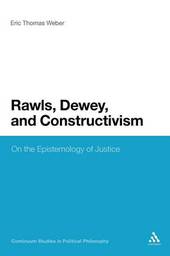
|
Rawls, Dewey, and Constructivism: On the Epistemology of Justice
Paperback / softback
Main Details
Description
In Rawls, Dewey, and Constructivism, Eric Weber examines and critiques John Rawls' epistemology and the unresolved tension - inherited from Kant - between Representationalism and Constructivism in Rawls' work. Weber argues that, despite Rawls' claims to be a constructivist, his unexplored Kantian influences cause several problems. In particular, Weber criticises Rawls' failure to explain the origins of conceptions of justice, his understanding of "persons" and his revival of Social Contract Theory. Drawing on the work of John Dewey to resolve these problems, the book argues for a rigorously constructivist approach to the concept of justice and explores the practical implications of such an approach for Education.
Author Biography
Eric Thomas Weber is assistant professor of Public Policy Leadership at the University of Mississippi, USA. He has published in Human Studies, Review of Policy Research, Skepsis, William James Studies, Contemporary Pragmatism, and Transactions of the Charles S. Peirce Society. He is the author of Rawls, Dewey, and Constructivism (Continuum, 2010).
Reviews... Weber's critique is respectful rather than polemical, remaining robust but also judicious and collegial throughout... What distinguishes this work is its comprehensive identification of Kant as the primary source of epistemological ambiguity in Rawls and the subsequent force of Weber's rich illustration of the merits of Deweyan philosophy in plugging these deficiencies and more. -- Political Studies Review Vol. 10 "Eric Weber provides a well considered and carefully crafted analysis of the work of John Rawls from a Pragmatist perspective. Chapter six alone, 'Dewey and Rawls on Education,' is worth the price of admission." - Larry A. Hickman, Center for Dewey Studies, Southern Illinois University, USA "Eric Thomas Weber's comparative study identifies a deep Kantian tension between constructivism and representationalism in Rawls. His well informed, very clear and persuasive critique of Rawls highlights the many resources of Dewey's constructivism and constructivist epistemology for democratic political philosophy." - Tom Rockmore, Duquesne University, USA Eric Thomas Weber's excellent book raises a constructivist challenge against Rawls's constructivism... In his short, tightly-argued book, Weber further develops the constructivist criticism of Rawls in creatively comparing and contrasting the views of Rawls and Dewey. -- Notre Dame Philosophical Reviews 'Weber's Rawls, Dewey and Constructivism provides a welcome addition tothe Rawls literature by offering a Deweyan critique of,and alternative to, Rawlsian constructivism....In the contemporary political and economic climate, Weber's call for strengthening the American tradition of public, humanistic education is refreshing.' -- Nicholas Tampio, Department of Political Science, Fordham University * H' Net Review * "Eric Thomas Weber's excellent book raises a constructivist challenge against Rawls's constructivism...Weber's Deweyan critique of Rawls's constructivist conception of justice points to the difficulty in grasping Kantian constructivism. In Rawls's writings, the reference to Kantian constructivism is so vague as to be essentially meaningless. That is one of the implications of this very useful book." - Notre Dame Philosophical Reviews -- Tom Rockmore, Duquesne University * Notre Dame Philosophical Reviews * Weber's first book covers more territory than its title suggests, and provides concise, relevant, and accurate summaries of a host of philosophers from Kant's contemporaries to ours. The relevance of Dewey's philosophy of education to political philosophy and its ability to resolve the tensions within the dominant philosophy of Rawls, suggests that there is a need for this book...Weber's assessment of Rawls's constructivism will help readers determine if Deweyan pragmatists should in fact be Rawlsians, as Talisse provocatively suggested, or if, as Weber would have it, Rawlsians should turn to Dewey. * Review of Metaphysics *
|